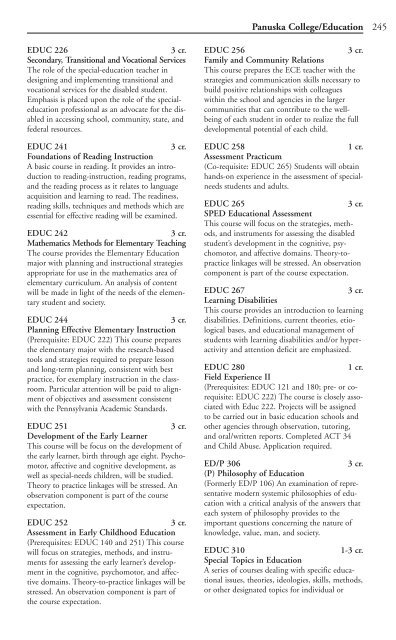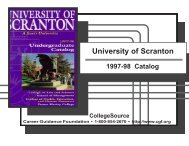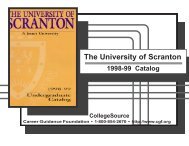2003-2004 - The University of Scranton
2003-2004 - The University of Scranton
2003-2004 - The University of Scranton
Create successful ePaper yourself
Turn your PDF publications into a flip-book with our unique Google optimized e-Paper software.
EDUC 226 3 cr.<br />
Secondary, Transitional and Vocational Services<br />
<strong>The</strong> role <strong>of</strong> the special-education teacher in<br />
designing and implementing transitional and<br />
vocational services for the disabled student.<br />
Emphasis is placed upon the role <strong>of</strong> the specialeducation<br />
pr<strong>of</strong>essional as an advocate for the disabled<br />
in accessing school, community, state, and<br />
federal resources.<br />
EDUC 241 3 cr.<br />
Foundations <strong>of</strong> Reading Instruction<br />
A basic course in reading. It provides an introduction<br />
to reading-instruction, reading programs,<br />
and the reading process as it relates to language<br />
acquisition and learning to read. <strong>The</strong> readiness,<br />
reading skills, techniques and methods which are<br />
essential for effective reading will be examined.<br />
EDUC 242 3 cr.<br />
Mathematics Methods for Elementary Teaching<br />
<strong>The</strong> course provides the Elementary Education<br />
major with planning and instructional strategies<br />
appropriate for use in the mathematics area <strong>of</strong><br />
elementary curriculum. An analysis <strong>of</strong> content<br />
will be made in light <strong>of</strong> the needs <strong>of</strong> the elementary<br />
student and society.<br />
EDUC 244 3 cr.<br />
Planning Effective Elementary Instruction<br />
(Prerequisite: EDUC 222) This course prepares<br />
the elementary major with the research-based<br />
tools and strategies required to prepare lesson<br />
and long-term planning, consistent with best<br />
practice, for exemplary instruction in the classroom.<br />
Particular attention will be paid to alignment<br />
<strong>of</strong> objectives and assessment consistent<br />
with the Pennsylvania Academic Standards.<br />
EDUC 251 3 cr.<br />
Development <strong>of</strong> the Early Learner<br />
This course will be focus on the development <strong>of</strong><br />
the early learner, birth through age eight. Psychomotor,<br />
affective and cognitive development, as<br />
well as special-needs children, will be studied.<br />
<strong>The</strong>ory to practice linkages will be stressed. An<br />
observation component is part <strong>of</strong> the course<br />
expectation.<br />
EDUC 252 3 cr.<br />
Assessment in Early Childhood Education<br />
(Prerequisites: EDUC 140 and 251) This course<br />
will focus on strategies, methods, and instruments<br />
for assessing the early learner’s development<br />
in the cognitive, psychomotor, and affective<br />
domains. <strong>The</strong>ory-to-practice linkages will be<br />
stressed. An observation component is part <strong>of</strong><br />
the course expectation.<br />
Panuska College/Education 245<br />
EDUC 256 3 cr.<br />
Family and Community Relations<br />
This course prepares the ECE teacher with the<br />
strategies and communication skills necessary to<br />
build positive relationships with colleagues<br />
within the school and agencies in the larger<br />
communities that can contribute to the wellbeing<br />
<strong>of</strong> each student in order to realize the full<br />
developmental potential <strong>of</strong> each child.<br />
EDUC 258 1 cr.<br />
Assessment Practicum<br />
(Co-requisite: EDUC 265) Students will obtain<br />
hands-on experience in the assessment <strong>of</strong> specialneeds<br />
students and adults.<br />
EDUC 265 3 cr.<br />
SPED Educational Assessment<br />
This course will focus on the strategies, methods,<br />
and instruments for assessing the disabled<br />
student’s development in the cognitive, psychomotor,<br />
and affective domains. <strong>The</strong>ory-topractice<br />
linkages will be stressed. An observation<br />
component is part <strong>of</strong> the course expectation.<br />
EDUC 267 3 cr.<br />
Learning Disabilities<br />
This course provides an introduction to learning<br />
disabilities. Definitions, current theories, etiological<br />
bases, and educational management <strong>of</strong><br />
students with learning disabilities and/or hyperactivity<br />
and attention deficit are emphasized.<br />
EDUC 280 1 cr.<br />
Field Experience II<br />
(Prerequisites: EDUC 121 and 180; pre- or corequisite:<br />
EDUC 222) <strong>The</strong> course is closely associated<br />
with Educ 222. Projects will be assigned<br />
to be carried out in basic education schools and<br />
other agencies through observation, tutoring,<br />
and oral/written reports. Completed ACT 34<br />
and Child Abuse. Application required.<br />
ED/P 306 3 cr.<br />
(P) Philosophy <strong>of</strong> Education<br />
(Formerly ED/P 106) An examination <strong>of</strong> representative<br />
modern systemic philosophies <strong>of</strong> education<br />
with a critical analysis <strong>of</strong> the answers that<br />
each system <strong>of</strong> philosophy provides to the<br />
important questions concerning the nature <strong>of</strong><br />
knowledge, value, man, and society.<br />
EDUC 310 1-3 cr.<br />
Special Topics in Education<br />
A series <strong>of</strong> courses dealing with specific educational<br />
issues, theories, ideologies, skills, methods,<br />
or other designated topics for individual or
















